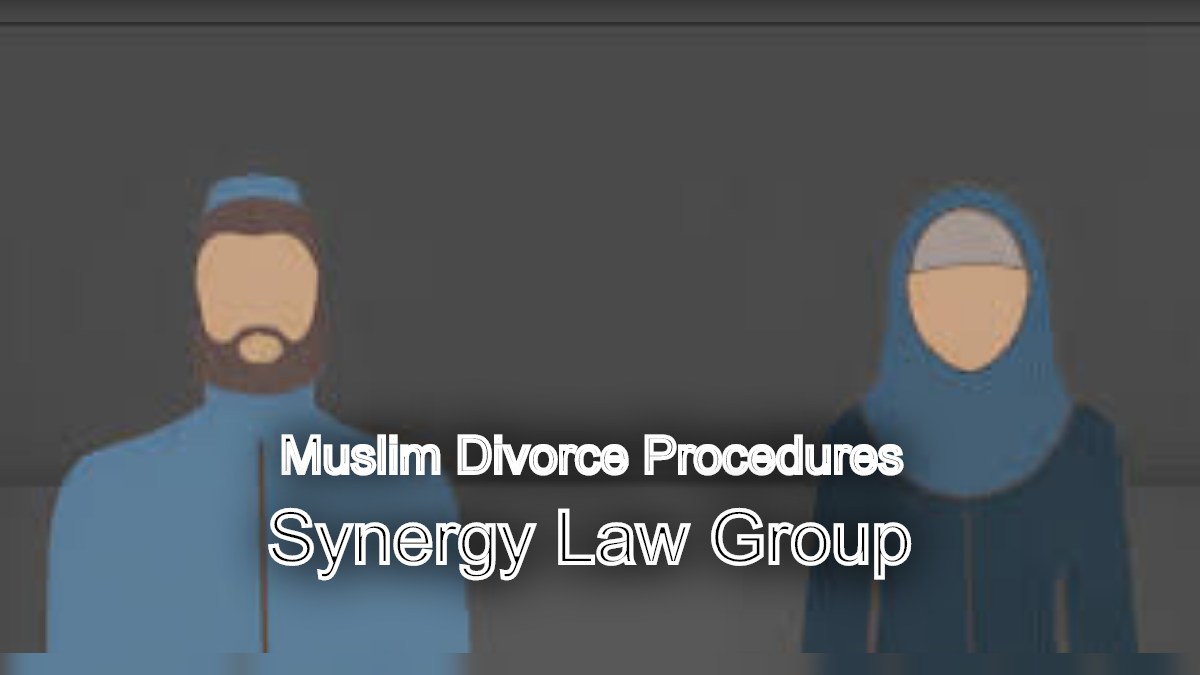Muslim Divorce Procedures: Divorce, regardless of religious affiliation, is a deeply personal and often challenging experience. However, when it involves Islamic law, the procedures can seem particularly intricate. Thus, it becomes crucial to understand the specific legal framework governing Muslim divorce. To that end, this article delves into the procedures, with guidance from Synergy Law Group, a family court law firm committed to a supportive approach.
Navigating the Complexities: Muslim Divorce Procedures with Synergy Law Group
Understanding the Foundations: Islamic Law and Divorce.
In Islamic law, divorce is permissible, but it is generally discouraged. Indeed, the emphasis is on reconciliation and preserving the marital bond. Therefore, various forms of divorce exist, each with its own set of rules and conditions. For instance, Talaq is a form of divorce initiated by the husband. Conversely, Khula is initiated by the wife. Additionally, Faskh-e-Nikah involves the dissolution of marriage by a court. To be sure, understanding these distinctions is paramount.
Talaq: Husband-Initiated Divorce.
Talaq involves the husband pronouncing divorce upon his wife. In this regard, there are different forms of Talaq. Specifically, Talaq-e-Ahsan is considered the most approved form. Namely, it entails a single pronouncement of divorce during a period of tuhr (purity). Following this, an iddah (waiting period) of three menstrual cycles ensues. During iddah, reconciliation is possible. However, if reconciliation does not occur, the divorce becomes irrevocable. In contrast, Talaq-e-Hasan involves three pronouncements of divorce during three successive periods of tuhr. Finally, Talaq-e-Biddat, also known as triple talaq, was made illegal in India.
Khula: Wife-Initiated Divorce.
Alternatively, Khula involves the wife seeking divorce. Specifically, she typically returns the mahr (dowry) or offers some other form of compensation to the husband. In essence, Khula is a mutual agreement to dissolve the marriage. Therefore, it requires the husband’s consent.
Faskh-e-Nikah: Judicial Dissolution.
Additionally, Faskh-e-Nikah involves a court dissolving the marriage. Indeed, this can occur on various grounds, such as the husband’s cruelty, desertion, or impotence. Thus, this avenue is pursued when either spouse has valid legal reasoning to end the marriage.
The Role of Family Courts: Navigating Legal Procedures.
Subsequently, family courts play a crucial role in Muslim divorce proceedings. Namely, these courts ensure that the divorce process adheres to Islamic law and Indian legal provisions. Therefore, engaging a competent family court advocate, such as those at Synergy Law Group, becomes essential. More over, these courts deal with things such as the providing of maintainence, or dealing with the rights of the children involved.
Synergy Law Group’s Supportive Approach: Client-Centric Guidance.
Nevertheless, amidst the legal complexities, Synergy Law Group emphasizes a supportive approach. Namely, they recognize the emotional turmoil associated with divorce. For instance, they provide client-centric guidance, ensuring that individuals understand their rights and options. Moreover, they assist in navigating the legal procedures, minimizing stress and confusion. Therefore, their service is more than providing legal advice, but acting as a support system.
Maintenance and Child Custody: Crucial Considerations.
Furthermore, divorce proceedings often involve crucial considerations such as maintenance and child custody. To be sure, Islamic law provides for maintenance of the wife and children. Moreover, child custody decisions are made based on the child’s best interests. Therefore, Synergy Law Group provides sound guidance on these issues, securing favorable outcomes for their clients. It is important to know that these matters can become very complicated.
Documentation and Evidence: Building a Strong Case.
Furthermore, meticulous documentation and evidence gathering are crucial in any divorce proceeding. For example, records of marriage, financial documents, and evidence of marital discord can be invaluable. Likewise, it is always a good idea to keep accurate and organized records.
Reconciliation Efforts: Exploring All Avenues.
Moreover, before pursuing divorce, family courts often encourage reconciliation efforts. Indeed, this aligns with the Islamic emphasis on preserving the marriage. Subsequently, Synergy Law Group assists in exploring all possible avenues for reconciliation.
Frequently Asked Questions
Answer: Talaq is a divorce initiated by the husband, involving pronouncements of divorce. Khula is initiated by the wife, where she typically returns the mahr or offers compensation to the husband, requiring his consent.
Answer: Faskh-e-Nikah is a judicial dissolution of marriage through a family court. This occurs on grounds like cruelty, desertion, or impotence, when a court intervenes to end the marriage.
Answer: Family courts ensure the divorce adheres to Islamic law and Indian legal provisions. They handle procedures, maintenance, child custody, and encourage reconciliation efforts.
Answer: Meticulous documentation, such as marriage records, financial documents, and evidence of marital discord, is crucial for building a strong case and ensuring a fair outcome.
Answer: Yes, Islamic law and Indian legal provisions provide for maintenance of the wife and children after divorce. The court determines the amount based on various factors.
The Importance of Legal Counsel: Expert Representation.
In conclusion, the complexities of Muslim divorce procedures underscore the importance of expert legal counsel. To that end, Synergy Law Group provides compassionate and competent representation, guiding individuals through this challenging time. Thus, they ensure that the clients’ rights are protected, and the legal procedures are navigated effectively.
Read More
- Domestic Violence and Legal Remedies: Top Rated Family Court Attorney’s Supportive Approach
- Combating Domestic Violence: Best Ranking Family Court Solicitor’s Supportive Approach
- Voidable marriage: Expert Divorce Advocates in Chennai
- Muslim Divorce Procedures: Best Ranking Family Court Advocate’s Supportive Approach
- Mental Disorders and Divorce: Expert Family Court Attorney’s Expertise
- National Government Services Portal


